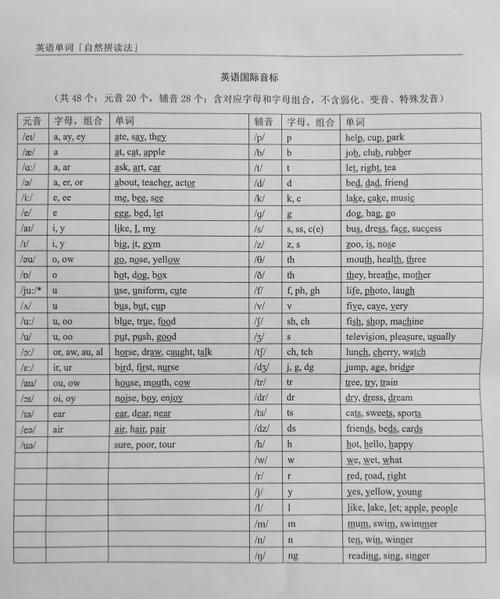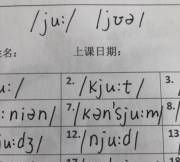本文目录
对不起我不知道用英语怎么写
我不知道的英语I don't know。
例句:
1、我不知道他是否说了真话。
I don't know if he's telling the truth or not.
2、我不知道该不该穿外套。
I wonder if I should wear a coat or not.

重点词汇:
know 知道 ; 知悉 ; 了解 ; 认识到 ; 懂得 ; 意识到 ; 确信 ; 确知 ; 肯定 ; 熟悉 ; 把…看作是 ; 将…称为 ; 能认出 ; 能区分 ; 学会 ; 看到过 ; 亲身体验。
telling告诉;说;讲述;告知;提供;说明;显示;表达;强有力的;有明显效果的;显著的;生动的;显露真实面目的,说明问题的;tell的现在分词;讲。
truth 真相 ; 实情 ; 事实 ; 真实情况 ; 真实 ; 真实性 ; 真理。
not 不 ;构成动词be、do和have及情态动词can或must等的否定形式。
不客气的英语怎么说
不的英语是no。
英 [nəʊ] 美 [noʊ]
adv. 不
adj. 没有;不是;禁止
n. 否定的回答;投反对票者
例句:He has no money.
翻译:他没有钱。
用法
adv. (副词)
1、no用作副词可表示拒绝或否定的回答,表示“不,不是”。
2、no作“毫不,一点儿也不”解时,常用于修饰形容词或副词的比较级形式,表示相反的意思;no还可用于表示惊奇或发生不幸时发出的惨呼。

反义词
yes
英 [jes] 美 [jes]
adv. 是;是的
n. 是(表示肯定)
v. 对...…说是
例句:Yes, you're quite right.
翻译:是的,你很对。
短语:yes or no test 是或否测试
48个英语音标正确读法
初中英语国际标准音标练习
元音 (20个) 单元音12个 前 元 音(4个) [i:] [i] [e] [æ]
后 元 音(5个) [ɑ:] [ɔ:] [ɔ] [u:] [u]
中 元 音(3个) [ʌ] [ə:] [ə]
双元音8个 合口双元音(5个) [ei] [əu] [ai] [au] [ɔi]
集中双元音(3个) [iə] [uə] [ɛə]
辅音 (28个) 清 辅 音(11个) [p] [t] [k] [f] [s] [θ] [ʃ] [tʃ] [tr] [ts] [h]
浊 辅 音(17个) [b] [d] [g] [v] [z] [ð] [ʒ] [dʒ] [dr] [dz] [l]
[m] [n] [ŋ] [j] [w] [r]
/i:/ bee/bi:/ feet/fi:t/ keep/ki:p/ key/ki:/ team/ti:m/ meet/mi:t/
/i/ it /it/ big/big/ city/siti/ give/giv/ sick/sik/
/e/ get/get/ best/best/ text/tekst/ help/help/
/æ/ fat/fæt/ have/hæv/ cat/kæt/ back/bæk/ hat/hæt/
/a:/ laugh/la:f/ glass/gla:s/ half/ha:f/ farm/fa:m/ park/pa:k/
/ ɔ:/ horse/hɔ: s/ saw/sɔ:/ corn/kɔ:n/ course/kɔ:s/ salt/sɔ:t/
/ ɔ / dog/dɔg/ pot/pɔt/ cost/kɔst/ what/wɔt/ honest/′ɔnist/
/u:/ food/fu:d/ moon/mu:n/ rule/ru:l/ loose/lu:s/ noon/nu:n/
/u/ book/buk/ put/put/ good/gud/ would/wud/ could/kud/
/ ʌ / must/mʌst/ does/dʌz/ money/′mʌni/ ugly/′ʌgli/ come/kʌm/
/ə:/ nurse/nə:s/ bird/bə:d/ burn/bə:n/ turn/tə:n/ girl/gə:l/
/ə / better/betə/ never/nevə/ worker/wə:kə/ welcome/welkəm/
/ei/ may/mei/ name/neim/ game/geim/ eight/eit/ age/eidʒ/
/əu/ no/nəu/ home/həum/ hope/həup/ wrote/rəut/ note/nəut/ pose/pəuz/
/ai/ eye/ai/ time/taim/ buy/bai/ right/rait/ bike/baik/ kite/kait/
/au/ now/nau/ out/aut/ how/hau/ about/ ə′baut/ south/sauθ/ house/haus/
/ɔi/ boy/bɔi/ toy/tɔi/ noise/nɔiz/ voice/vɔis/ point/pɔint/ coin/kɔin/
/iə/ ear/iə/ near/niə/ idea/ai′diə/ hear/hiə/ mere/miə/ spear/spiə/
/εə/ air/εə/ tear/tεə/ care/kεə/ dare/dεə/ fair/fεə/ there/ðεə/
/uə/ tour/tuə/ poor/puə/ sure/ʃuə/ moor/muə/(停泊) your/juə/
/p/ pea/pi:/ pie/pai/ top/tɔp/ cap/kæp/ people/pi:pl/ pride/praid/
/b/ bee/bi:/ by/bai/ buy/bai/ black/blæk/ bear/bεə/
/t/ let/let/ sat/sæt/ feet/fi:t/ team/ti:m/ tide/taid/
/d/ led/led/ sad/sæd/ feed/fi:d/ do/du:/ dear/diə/
/k/ lack/læk/ take/teik/ clock/klɔk/ class/kla:s/ weekend/′wi:kend/
/g/ big/big/ lag/læg/ glass/gla:s/ gum/gʌm/ good/gud/ guest/gest/
/f/ face/feis/ fast/fa:st/ leaf/li:f/ surf/sə:f/ favorite/′feivərit/
/v/ very/′veri/ five/faiv/ fever/′fi:və/ serve/sə:v/ never/′nevə/
/θ/ bath/ba:θ/(v洗澡) thick/θik/ mouth/mauθ/ breath/breθ/(n呼吸)
thought/θɔ:t/ author/´ɔθə/ truth/tru:θ/
/ð/ the/ ðə/ they/ðei/ that/ðæt/ mother/′mʌðə/ thus/ ðʌs/ then/ðen/
/s/ face/feis/ mouse/maus/ cakes/keiks/ caps/kæps/ likes/laiks/ stops/stɔps/
/z/ close/kləuz/ keys/ki:z/ boys/bɔiz/ pens/penz/ halves/ha:vz/
/tʃ/ catch/kætʃ/ cheep/tʃi:p/ rich/ritʃ/ watch/wtʃ/ child/tʃaild/ question/kwestʃən/ teach/ti:tʃ/ challenge/tʃlindʒ/
/dʒ/ orange/′ɔridʒ/ large/la:dʒ/ juice/dʒu:s/ job/dʒɔb/
/tr/ tree/tri:/ try/trai/ true/tru:/ trouble/traubl/ track/træk/
/dr/ dry/drai/ dream/dri:m/ dress/dres/ drink/driŋk/ hundred/′hʌndrid/
/ʃ/ she/ʃi:/ sharp/ʃa:p/ fish/fiʃ/ shock/ʃɔk/ shoe/ʃu:/
/ʒ/ pleasure/′pleʒə/ measure/′meʒə/ television/′teliviʒən/
/ts/ let′s/lets/ sports/spɔ:ts/ puts/puts/ writes/raits/ seats/si:ts/
/dz/ hands/hændz/ birds/bə:dz/ friends/freindz/ beds/bedz/ stands/stændz/
/h/ he/ hi:/ hard/ha:d/ him/him/ heard/hə:d/ half/ha:f/
/l/ like/laik/ late/leit/ learn/lə:n/ lead/li:d/ light/lait/
/m/ my/mai/ more/mɔ:/ seem/si:m/ meat/mi:t/ mind/maind/ men/men/
/n/ nice/nais/ wind/waind/ mind/maind/ rain/rein/ fine/fain/
/ŋ/ sing/siŋ/ wing/wiŋ/ ring/riŋ/ long/lɔŋ/ beautiful/bju:təfl/
/j/ you/ju:/ few/fju:/ yard/ja:d/ music/′mju:zik/ student/′stju:dnt/ excuse/ik′skju:z/
/w/ work/wə:k/ way/wei/ well/wel/ what/wɔt/ twelve/twelv/ twin/twin/
/r/ red/red/ road/rəud/ write/rait/ wrong/rɔŋ/ problem/′prɔbləm/
音标综合练习
1./i:/ /i/ /e/ /æ/
/bit/ /wi:k/ /di:l/ /riəl/ /kid/ /dig/ /kwik/ /tip/ /zip/ /rid/ /wil/ /fil/
bit week deal real kid dig quick tip zip rid will fill
/pet/ /pæk/ /gæp/ /kæg/ /næg/ /ræm/ /bætl/ /sed/ /′hæpi/ /ten/ /red/
pet pack gap cap nag ram battle said happy ten red
/′setl/ /træʃ/ /di′pend/
settle trash depend
2./a:/ / ɔ:/ / ɔ / /u:/ /u/
/a:sk/ /ma:sk/ /pa:st/ /fra:ns/ /ɔd/ /lɔ:n/ /nɔ:t/ /pɔ:z/ /fɔks/ /sɔk/
ask mask past France odd lawn naught pause fox sock
/fa:/ /la:dʒ / /ma:k/ /lɔ:d/ /tɔ:/ /stɔ:m/ /pɔt/ /krɔp/ /θɔt/ /prɔmis/
far large mark Lord torch storm pot crop thought promise
/huk/ /lu:s/ /sut/ /tuk/ /mud/ /θru:/ /pul/ /wud/
hook loose soot took mood through pull wood
3./ʌ/ /ə/ /ə/
/bʌz/ /dʌl/ /′hʌri/ /gʌlf/ /′trʌbl/ /ə:n/ /sə:f/ /′tə:nə/ /′begə/ /tʌk/
buss dull hurry gulf trouble earn surf turner begger tuck
/kə:b/ /ə:k/ /ə′merik / /′sɔkə/ /′kæmpə/ /sə′vei/ /pə′veid/ /pə′hæps/
curb irk America soccer camper survey pervade perhaps
/bə:′lesk/ /′mə:də/
burlesque murder
3./ei/ /əu/ /ai/ /au/ /ɔi/
/keip/ /greit/ /mein/ /prəpəuz/ /′məuʃən/ /stəun/ /′əuvə/ /sait/
kape great main propose motion stone over sight
/raim/ /daut/ /′taipist/ /aust/ /mɔist/ /′ɔistə/
rhyme doubt typist oust moist oyster
4./iə/ /ɛə/ /uə/
/viə/ /ə′fɛə/ /dɛə/ /skɛə/ /buən/ /guəd/ /′ruərəl/ /ə′piə/ /kəlʌmbiə/
veer affair dare scare bourn gourd rural appear Colombia
/mətiəriəl/ /mistiəriəs/
material mysterious
5./θ/ /ð/
/mʌnθ/ /θi:f/ /ðæt/ /ðæn/ /feiθ/ /tə′geðə/ /θæŋk/ /ðəm′selvz/
month thief that than faith together thank themselves
The sun Tongue Twister(绕口令)
(1)There are thirty-three trees there. (θ, ð)
(2)A big black bug bit the back of the big black bear. The big black bear beat back the big black bug. (/b/)
(3)She sells seashells on the seashore,and the shells she sells are seashells. I′m sure because if she sells shells at the seashore,the shells she sells are seashells for sure.
(/ θ/,/s/,/z/,/ʃ/)
(4)There is a kitten in the kitchen.In the kitchen,I fly the chicken.A fly flies into the kitchen while I′m frying the chicken.( /tʃ/)
(5)You are no need to light a night light on a light night like tonight.For a night,light′s a slight light and tonight′s a night that′s light.When a night′s light like tonight′s light,it′s really not quit right to light night lights with their slight light′s on the light night like tonight.(/n/--/l/)
(6)The sun shines on the small shop signs.(/s/--/ʃ/)
(7)Why didn′t you do that what I told you to do? (/ /--/ /)
(8)The doctor′s daughter knocked at the locked door.
(9)Mike likes to write by the nice bright light at night.
(10)Is this pair of scissors of his sister′s? Yes,this is the pair of scissors of his sister′s . (/s/--/z/)
(11)Pete picked up a piece of paper and put it into the paper basket. (/p/)
(12)William wants to know whether the weather will be wetter tomorrow. (/w/)

七年级英语48个音标怎么读
英语国际音标共48个:1)元音:[i:]、[i]、[_:]、[_]、[u:]、[u]、[_:]、[_]、[ɑ:]、[_]、[e]、[_]、[ei]、[ai]、[_i]、[__]、[u_]、[i_]、[au]、[_u];2)辅音:[p]、[b]、 [t]、[d]、[k]、[g]、[f]、[v]、[s]、[z]、[θ]、[_]、[tr]、[dr]、[ts]、[dz]、[m]、[n]、[_]、[h]、[l]、[r]、[j]、[w]
一站式出国留学攻略 ***ing.com

以上就是关于将不的英语音标怎么写 ,对不起我不知道用英语怎么写的全部内容,以及将不的英语音标怎么写 的相关内容,希望能够帮到您。
